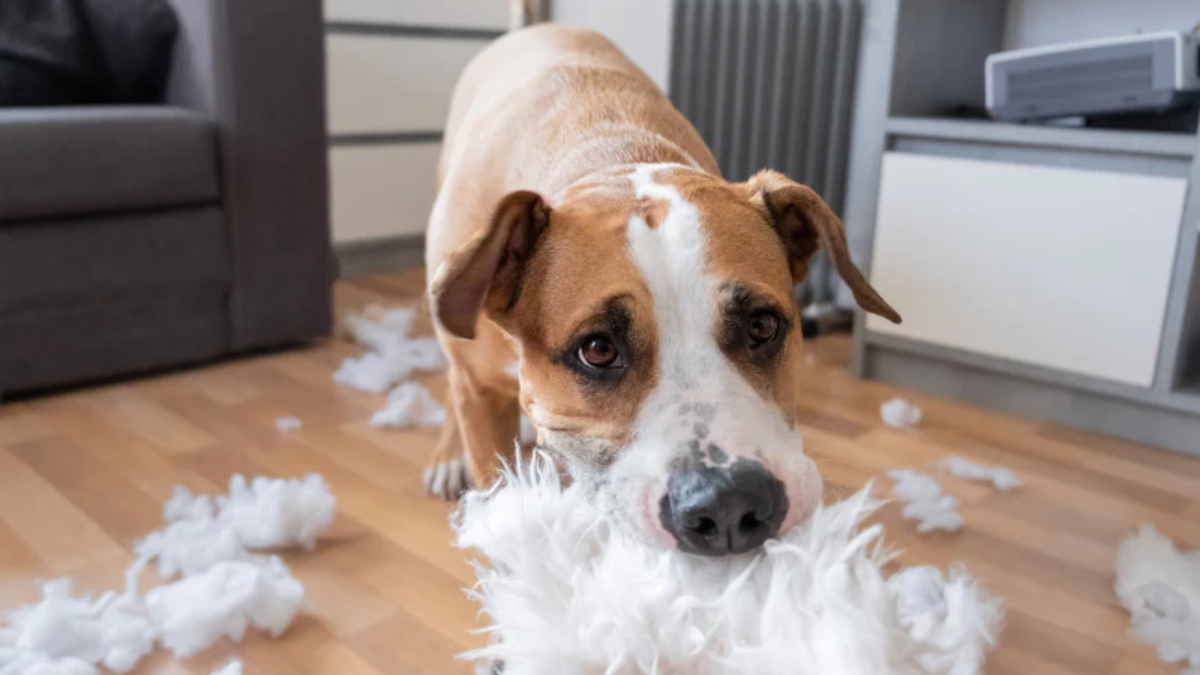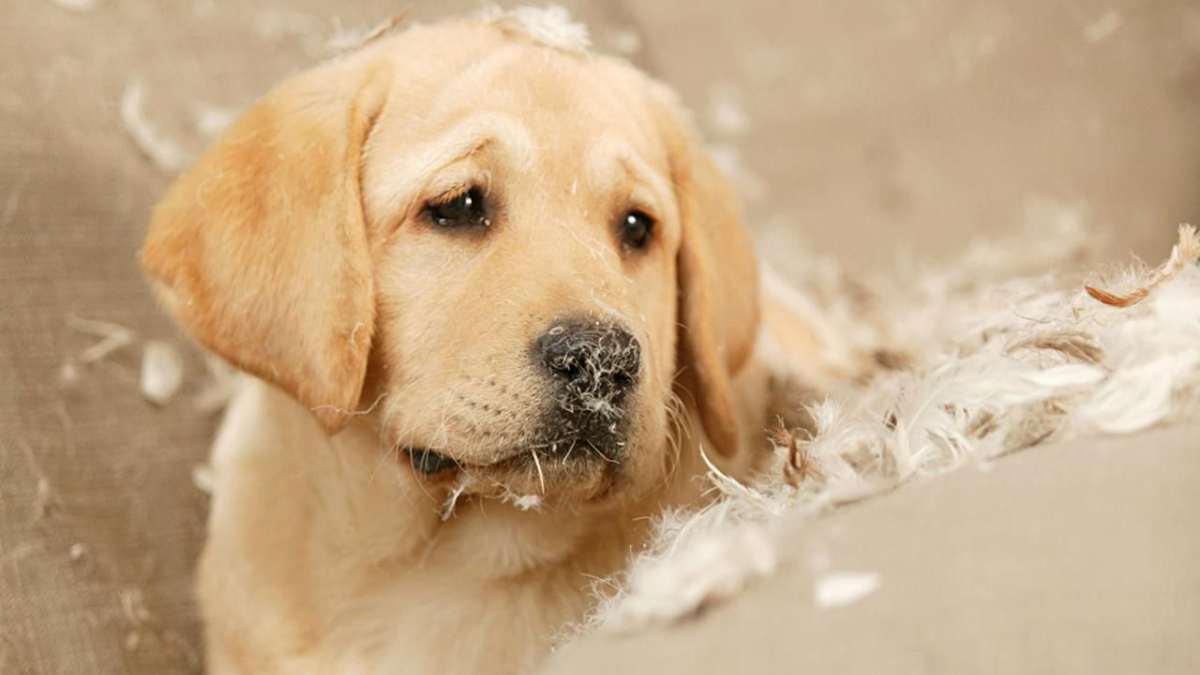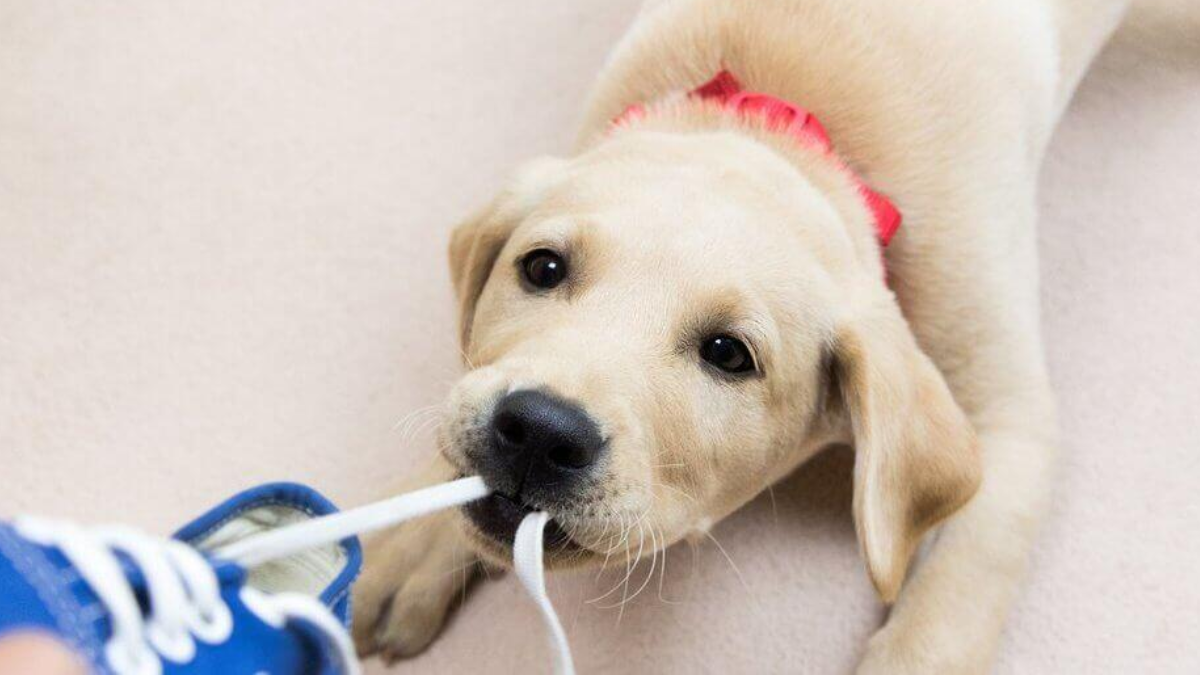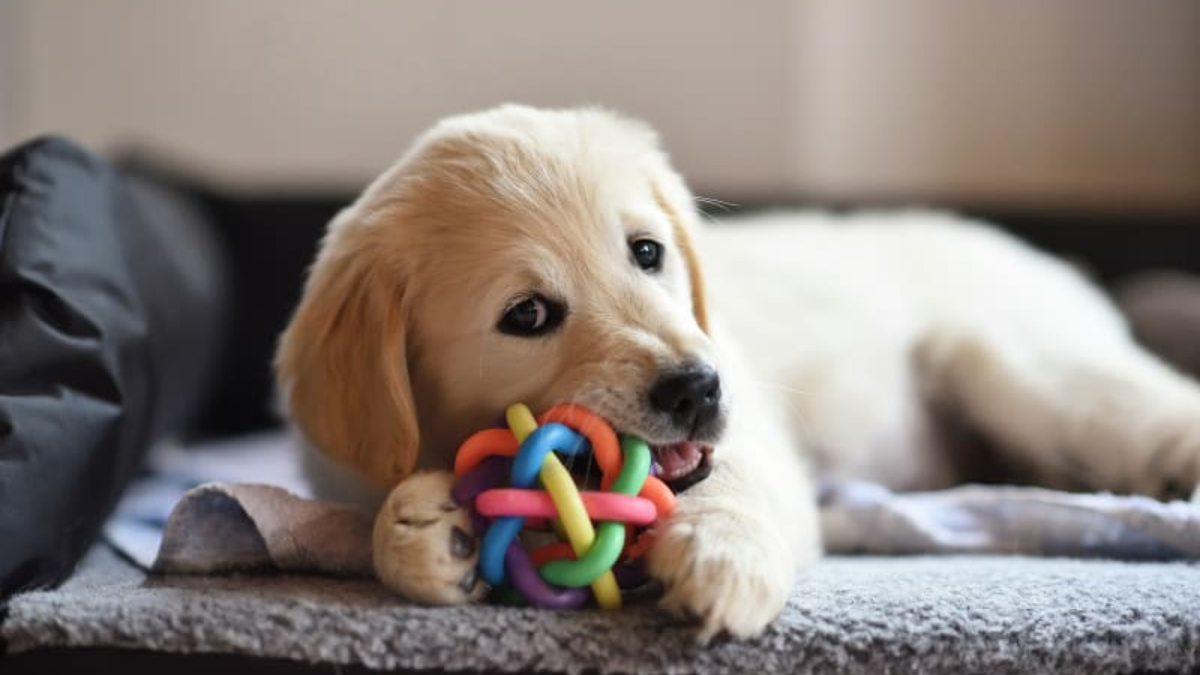Many dog owners have come home to find their favorite shoes or furniture chewed up by their furry friends. How to Stop Your Dog from Chewing When You're Away? This destructive behavior can be frustrating and expensive to deal with, especially when it happens while the owner is away. However, it's important to understand that chewing is a natural behavior for dogs and can be caused by a variety of factors, including boredom, anxiety, and teething.

To stop a dog from chewing on things when the owner is gone, it's important to address the root cause of the behavior. If the dog is bored, providing plenty of toys and activities to keep them occupied can help. If anxiety is the issue, creating a calm and safe environment for the dog and possibly seeking professional help may be necessary. Additionally, providing appropriate chew toys and discouraging the dog from chewing on inappropriate items can also be effective. With patience and consistency, it is possible to train a dog to stop destructive chewing behavior.
Understanding Dog Chewing Behavior
Dogs love to chew, and it is a natural behavior that is essential for their physical and mental well-being. However, when dogs chew on inappropriate objects such as furniture, shoes, and other household items, it can become a problem. Understanding why dogs chew is the first step in preventing destructive chewing behavior.
Reasons Dogs Chew
Dogs chew for a variety of reasons, including boredom, anxiety, stress, teething, and compulsive behavior. Puppies, in particular, chew to relieve the discomfort of teething and to explore their environment. Adult dogs may chew out of boredom or anxiety, especially if they are left alone for long periods.
Chewing During Puppyhood
Puppies have a natural urge to chew, and it is important to provide them with appropriate chew toys to satisfy this urge. Puppy-proofing your home by keeping valuable items out of reach can also prevent destructive chewing behavior.
The Role of Exercise and Play
Providing your dog with enough physical and mental stimulation through exercise and play can reduce boredom and anxiety, which are common causes of destructive chewing behavior. Regular exercise and playtime can also help prevent obesity and other health problems.

In conclusion, understanding why dogs chew is essential in preventing destructive chewing behavior. Providing appropriate chew toys, puppy-proofing your home, and providing enough physical and mental stimulation through exercise and play can help prevent destructive chewing behavior.
Preventing Destructive Chewing
Dogs chew for various reasons, including boredom, anxiety, and teething. However, destructive chewing can be frustrating and costly when your dog chews on furniture, pillows, and other valuables. Here are some ways to prevent destructive chewing:
Providing Appropriate Chew Toys
One of the most effective ways to prevent destructive chewing is by providing your dog with appropriate chew toys. Puzzle toys and edible chews are excellent options that keep your dog entertained and satisfy their urge to chew. Inedible chew bones are also great, but you should ensure they are the right size for your dog to prevent choking hazards.
Creating a Safe Space
Creating a safe space for your dog can also help prevent destructive chewing. A crate or confinement area can provide a secure and comfortable space for your dog when you're not around. Ensure the crate or confinement area is adequately sized for your dog and contains appropriate chew toys.

Puppy-Proofing Your Home
Puppy-proofing your home is crucial to prevent destructive chewing. Remove any items that your dog might chew on, such as electrical cords, shoes, and pillows. You can also use bitter sprays to deter your dog from chewing on furniture and other valuables. Additionally, ensure that your dog has access to appropriate chew toys and is never left unsupervised.
By incorporating these tips into your routine, you can help prevent destructive chewing and keep your home safe and comfortable for both you and your furry friend.
Training and Behavior Modification
Teaching "Leave It" and "Drop It"
Teaching a dog the "leave it" and "drop it" commands can help prevent destructive chewing behavior. The "leave it" command teaches the dog to leave objects alone, while the "drop it" command teaches the dog to release objects from their mouth.
To teach "leave it," start by placing a treat on the ground and covering it with your hand. When the dog tries to get the treat, say "leave it" and reward them with a different treat. Repeat this until the dog reliably leaves the treat alone when you say "Leave it." To teach "drop it," start by giving the dog a toy or object to hold in their mouth. Say "drop it" and offer a treat as a reward when they release the object. Repeat this until the dog reliably drops objects when you say "Drop it."
The Importance of Consistency
Consistency is key when it comes to training and behavior modification. It's important to consistently reinforce good behavior and discourage bad behavior. This means rewarding the dog when they behave appropriately, and redirecting or correcting them when they engage in destructive chewing behavior.
It's also important to be consistent in the use of commands and cues. Use the same words and gestures every time you give a command, and make sure everyone in the household is using the same commands and cues.
Addressing Separation Anxiety
Destructive chewing behavior can also be a symptom of separation anxiety in dogs. If a dog is anxious or stressed when left alone, they may engage in destructive behaviors as a way to cope.

If separation anxiety is suspected, it's important to work with a professional dog trainer or behaviorist to develop a behavior modification plan. This may include desensitization exercises, medication, and other strategies to help the dog feel more comfortable and secure when left alone.
Overall, addressing destructive chewing behavior requires a combination of training, behavior modification, and addressing underlying issues such as separation anxiety. With patience, consistency, and the help of a professional if needed, it's possible to help a dog overcome destructive chewing behavior.
Enrichment and Mental Stimulation
Dogs chew on things when they are bored or frustrated, so providing them with mental stimulation and interactive play can help prevent destructive chewing. Here are some ways to keep your dog mentally stimulated while you are away:
Interactive Play and Exercise
Before leaving your dog alone, make sure they have had plenty of physical exercise and interactive play. Playing fetch, tug-of-war, or other games can help tire them out and reduce their anxiety.
Using Puzzle Toys and Treats
Puzzle toys and treats can provide mental stimulation and keep your dog occupied while you are away. Fill a Kong toy with peanut butter or freeze a treat inside a puzzle toy to keep your dog entertained for longer periods. This will not only reduce their boredom but also prevent them from chewing on furniture or other items.
Rotating Toys and Distracting Techniques
Rotate your dog's favorite toys to keep them interested and engaged. This will also prevent them from getting bored with the same toys and turning to destructive chewing. You can also try distracting techniques, such as playing calming music or leaving the TV on to provide background noise and make your dog feel less lonely.
Using chewing deterrents, such as bitter apple spray, can also discourage your dog from chewing on furniture or other items. However, it is important to note that these deterrents should be used sparingly and as a last resort.
By providing your dog with mental stimulation, exercise, and rotating toys, you can help prevent destructive chewing and keep them happy and healthy while you are away.
Health and Nutritional Considerations
Dental Care for Your Dog
Dental care is an essential aspect of your dog's overall health. Chewing can help promote dental health by removing plaque and tartar buildup from your dog's teeth. Providing your dog with safe chew toys can help satisfy their natural urge to chew and promote healthy teeth and gums.
It is important to note that not all chew toys are created equal. Hard or abrasive toys can cause damage to your dog's teeth and gums. It is recommended to choose toys that are specifically designed for dental care, such as those made from rubber or nylon.
Regular dental check-ups with a veterinarian can also help ensure your dog's dental health. They can identify any potential issues and provide appropriate treatment.
Understanding Nutritional Needs and Hunger
Chewing behavior can also be influenced by your dog's nutritional needs and hunger levels. Puppies, for example, may chew more frequently as a way to soothe teething pain. Providing appropriate chew toys and treats can help satisfy this urge without causing damage to your belongings.

It is important to ensure that your dog is receiving a balanced and nutritious diet. Consult with your veterinarian to determine the appropriate type and amount of food for your dog's specific needs. Overfeeding can lead to obesity, which can also contribute to destructive chewing behavior.
In addition to providing appropriate food and treats, it is important to monitor your dog's hunger levels. Dogs may chew out of boredom or anxiety, so providing mental stimulation and exercise can help alleviate these issues.
Overall, promoting dental health and understanding your dog's nutritional needs and hunger levels can help prevent destructive chewing behavior.
When to Seek Professional Help
While many cases of destructive chewing can be resolved with proper training and management, there are situations where seeking professional help is necessary. Here are some instances where it may be beneficial to consult with a trainer or behaviorist:
Identifying Compulsive and Destructive Behaviors
If your dog's chewing behavior is excessive and persistent, it may be a sign of a deeper issue such as anxiety or stress. Compulsive behaviors like excessive chewing can be difficult to manage without professional help. A trainer or behaviorist can help identify the root cause of the behavior and develop a personalized plan to address it.
Consulting with a Trainer or Behaviorist
If you have tried various methods to curb your dog's destructive chewing behavior with little success, it may be time to seek professional help. A professional dog trainer or behaviorist can evaluate your dog's behavior and provide you with a customized training plan to address the issue. They can also provide guidance on how to properly manage and supervise your dog to prevent further destructive behavior.
Utilizing Resources Like the AKC
The American Kennel Club (AKC) offers a variety of resources for dog owners, including books and e-books on dog training and behavior. The AKC also has a GoodDog! Helpline, where certified trainers can provide advice and guidance on a range of dog-related issues, including destructive chewing. Utilizing these resources can be a helpful first step in addressing your dog's behavior.

In summary, seeking professional help can be beneficial in cases where your dog's chewing behavior is persistent, excessive, or a sign of a deeper issue. A trainer or behaviorist can help identify the root cause of the behavior and provide a customized plan to address it. The AKC also offers resources that can help manage your dog's behavior.
Conclusion:
In conclusion, addressing How to Stop Your Dog From Chewing When You're Away? requires a combination of understanding, training, and environmental management. Begin by identifying the root cause of the chewing behavior, whether it's due to boredom, anxiety, or teething. Once you understand the underlying reason, implement appropriate measures to address it.
Provide your dog with plenty of mental and physical stimulation before leaving them alone, such as interactive toys, puzzle feeders, and exercise. Additionally, create a safe and comfortable environment by puppy-proofing your home and providing appropriate chew toys to redirect their chewing behavior.
Consistency is key when training your dog to chew on appropriate items. Use positive reinforcement techniques to reward desired behaviors and discourage chewing on forbidden objects. Consider using deterrent sprays or bitter-tasting products on items you want to protect from chewing.
If separation anxiety is a contributing factor, gradually desensitize your dog to being alone through crate training or gradually increasing the duration of absences.
Remember, patience and persistence are essential when teaching your dog to stop chewing when you're away. With time, consistent training, and a supportive environment, you can effectively curb this behavior and ensure your dog's well-being while you're apart.
Frequently Asked Questions (FAQs)
- What are effective strategies to prevent dogs from chewing furniture when left alone?
Several strategies can be effective in preventing dogs from chewing furniture when left alone. One of the most important is to provide your dog with plenty of exercises and mental stimulation before leaving the house. This can include taking your dog for a walk, playing games, or providing puzzle toys that require problem-solving skills.
Another effective strategy is to create a safe and comfortable space for your dog when you are not at home. This can include using a crate or a playpen or designating a specific room that is off-limits to your dog. Be sure to provide plenty of toys and chews to keep your dog occupied.
- How can I train my dog to stop being destructive when I'm not at home?
Training your dog to stop being destructive when you are not at home can take time and patience, but it is possible. One effective strategy is to use positive reinforcement training to teach your dog what behaviors are acceptable and what are not. This can include rewarding your dog for chewing on appropriate items, such as toys or chews, and redirecting them when they start to chew on furniture or other household items.
It is also important to be consistent in your training and to set clear boundaries for your dog. This can include using verbal cues to indicate what behaviors are acceptable and what are not, and providing plenty of positive reinforcement when your dog follows your commands.
- What are the best chew toys to keep my dog occupied and prevent destruction?
Many different types of chew toys can be effective in keeping your dog occupied and preventing destruction. Some of the best options include durable rubber toys, puzzle toys that require problem-solving skills, and bones or antlers that are safe for your dog to chew on.
It is important to choose toys that are appropriate for your dog's size and chewing style and to supervise your dog when they are playing with toys to ensure their safety.
- Why has my dog started to chew things suddenly, and how can I address it?
There are many reasons why a dog may suddenly start to chew things, including stress, boredom, anxiety, or a medical issue. If your dog has suddenly started to chew things, it is important to rule out any underlying medical issues by taking them to the vet.
Once any medical issues have been addressed, it is important to identify the root cause of your dog's chewing behavior and address it directly. This may involve providing more exercise and mental stimulation, creating a safe and comfortable space for your dog when you are not at home, or working with a professional trainer to address any behavioral issues.
- Are there any home remedies to discourage my dog from chewing household items?
Several home remedies can be effective in discouraging dogs from chewing household items. One of the most effective is to use bitter apple spray, which can be sprayed on furniture and other household items to make them taste unpleasant to dogs.
Other home remedies include using citrus or vinegar sprays, providing plenty of appropriate chew toys and bones, and using positive reinforcement training to teach your dog what behaviors are acceptable and what are not.
- How can I modify my dog's behavior to stop them from chewing walls?
Chewing walls can be a difficult behavior to modify, but it is possible with patience and consistency. One effective strategy is to provide your dog with plenty of appropriate chew toys and bones and to supervise them closely when they are in areas where they may be tempted to chew on walls.
It is also important to identify the root cause of your dog's chewing behavior and address it directly. This may involve providing more exercise and mental stimulation, creating a safe and comfortable space for your dog when you are not at home, or working with a professional trainer to address any behavioral issues.